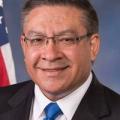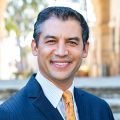37th Assembly District
Not in 37th Assembly District? Find your guide.
RETURN BALLOTS BY TUESDAY, MARCH 3RD
The Courage California Voter Guide compiles the information that allows you to make informed decisions about the races on your ballot, based on your values. Vote in every race on your ballot! It's our right and our responsibility. Please share this guide with your friends and family.
Have questions about voting in Santa Barbara County? Find out how to vote in Santa Barbara County.
24th Congressional District
Representative Salud Carbajal, a veteran, was born in Mexico and emigrated as a child with his family to Arizona and later Oxnard, CA. After high school, Carbajal attended the University of California at Santa Barbara (UCSB) and went on to obtain his Master's Degree in Organizational Management from the Fielding University. Carbajal spent eight years in the United States Marine Corps, including active duty during the 1991 Gulf War.
Carbajal was elected to the 24th District in 2017 after serving on the Santa Barbara County Board of Supervisors for 12 years. According to campaign materials, he is running for reelection on a platform that promotes a robust Central Coast through investments in infrastructure and housing, renewable energy and environmental protections, and workforce development.
Salud serves on the House Committee on Armed Services, the House Committee on Agriculture, and the House Committee on Transportation and Infrastructure, where he was elected to serve as the Vice Chair. As part of his commitment to renewable energy, Salud’s first act in Congress was to introduce the California Clean Coast Act, which would ban future offshore oil and gas drilling on California’s coast. He also secured $1 million for the Santa Barbara Veterans Treatment Courts and has introduced legislation to combat veteran homelessness.
Representative Carbajal is being challenged by Andy Caldwell (R), a conservative radio host, and Kenneth Young (NPP). Based on our analysis, Rep. Salud Carbajal has consistently demonstrated a commitment to progressive issues, from protecting the environment to ensuring DACA protections remain in place.
According to our analysis, Rep. Carbajal is the strongest choice for progressive leadership in this district.
Representative Salud Carbajal, a veteran, was born in Mexico and emigrated as a child with his family to Arizona and later Oxnard, CA. After high school, Carbajal attended the University of California at Santa Barbara (UCSB) and went on to obtain his Master's Degree in Organizational Management from the Fielding University. Carbajal spent eight years in the United States Marine Corps, including active duty during the 1991 Gulf War.
Carbajal was elected to the 24th District in 2017 after serving on the Santa Barbara County Board of Supervisors for 12 years. According to campaign materials, he is running for reelection on a platform that promotes a robust Central Coast through investments in infrastructure and housing, renewable energy and environmental protections, and workforce development.
Salud serves on the House Committee on Armed Services, the House Committee on Agriculture, and the House Committee on Transportation and Infrastructure, where he was elected to serve as the Vice Chair. As part of his commitment to renewable energy, Salud’s first act in Congress was to introduce the California Clean Coast Act, which would ban future offshore oil and gas drilling on California’s coast. He also secured $1 million for the Santa Barbara Veterans Treatment Courts and has introduced legislation to combat veteran homelessness.
Representative Carbajal is being challenged by Andy Caldwell (R), a conservative radio host, and Kenneth Young (NPP). Based on our analysis, Rep. Salud Carbajal has consistently demonstrated a commitment to progressive issues, from protecting the environment to ensuring DACA protections remain in place.
According to our analysis, Rep. Carbajal is the strongest choice for progressive leadership in this district.
State Assembly, 37th District
There are two well-qualified candidates in this race who have received broad support from progressive advocates and leaders: Elsa Granados and Cathy Murillo. After extensive research, we believe both are good choices. Read the full descriptions of each candidate to find the candidate who best fits your values and priorities for District 37 Assemblymember.
Cathy Murillo is in her first term as the Mayor of Santa Barbara, and was previously the first Latina ever elected to the Santa Barbara City Council. Prior to her election to the council, she was the News and Public Affairs Director of KCSB. Murillo has been a long time education advocate, and is running on a platform that calls for more housing, improved educational opportunities, and addressing climate change.
As mayor and council member, she had a reputation for being active in the community. She supported increasing housing stock, including the development of market rate as well as affordable units. She has advocated for a multi-faceted approach to addressing the city’s homeless crisis, including piloting a day time pop-up center with services, and setting up lockers near public spaces for homeless individuals to store their property.
Murillo is running against Jonathan Abboud (D), Steve Bennett (D), Stephen Blum (D), Jason Dominguez (D), Elsa Granados (D), and Charles W. Cole (R). Murillo is a strong progressive choice because of her community support and track record of housing and educational advocacy.
According to our analysis, Murillo is a strong choice for progressive leadership in office.
Cathy Murillo is in her first term as the Mayor of Santa Barbara, and was previously the first Latina ever elected to the Santa Barbara City Council. Prior to her election to the council, she was the News and Public Affairs Director of KCSB. Murillo has been a long time education advocate, and is running on a platform that calls for more housing, improved educational opportunities, and addressing climate change.
As mayor and council member, she had a reputation for being active in the community. She supported increasing housing stock, including the development of market rate as well as affordable units. She has advocated for a multi-faceted approach to addressing the city’s homeless crisis, including piloting a day time pop-up center with services, and setting up lockers near public spaces for homeless individuals to store their property.
Murillo is running against Jonathan Abboud (D), Steve Bennett (D), Stephen Blum (D), Jason Dominguez (D), Elsa Granados (D), and Charles W. Cole (R). Murillo is a strong progressive choice because of her community support and track record of housing and educational advocacy.
According to our analysis, Murillo is a strong choice for progressive leadership in office.
Elsa Granados was raised in Los Angeles, and has worked in Santa Barbara for over 20 years. According to campaign materials, she is running for State Assembly because she wants to use her extensive leadership experience to advocate for policies that protect her community and local natural resources.
Granados is the longtime Executive Director of Standing Together to End Sexual Assault, a nonprofit that amplifies social injustices, and advocates for policy and cultural changes to eradicate violence against women. At the state and national level, Granados has been a proactive advocate for sexual violence prevention. She has lobbied at the statehouse for increased rape crisis funding, provided feedback on the Violence Against Women Act (VAWA), and advocated for supports specific to women who are incarcerated, farm workers, and indigenous. She has centered women's rights, environmental issues, and affordable housing in her campaign, arguing for the importance of a level playing field for all residents. Granados serves on the board of the Santa Barbara Women's Political Committee and has received their endorsement in this race.
Granados is running against candidate Charles Cole (R), Jonathan Abboud (D), Steve Bennett (D), Stephen Blum (D), Jason Dominguez (D), and Cathy Murillo (D) for this open seat. According to recent election results, Democrats usually win this seat. Granados is a strong progressive choice because of her long history in the community and her collaborative approach to social justice advocacy.
According to our analysis, Elsa Granados is a strong choice for progressive leadership in office.
Elsa Granados was raised in Los Angeles, and has worked in Santa Barbara for over 20 years. According to campaign materials, she is running for State Assembly because she wants to use her extensive leadership experience to advocate for policies that protect her community and local natural resources.
Granados is the longtime Executive Director of Standing Together to End Sexual Assault, a nonprofit that amplifies social injustices, and advocates for policy and cultural changes to eradicate violence against women. At the state and national level, Granados has been a proactive advocate for sexual violence prevention. She has lobbied at the statehouse for increased rape crisis funding, provided feedback on the Violence Against Women Act (VAWA), and advocated for supports specific to women who are incarcerated, farm workers, and indigenous. She has centered women's rights, environmental issues, and affordable housing in her campaign, arguing for the importance of a level playing field for all residents. Granados serves on the board of the Santa Barbara Women's Political Committee and has received their endorsement in this race.
Granados is running against candidate Charles Cole (R), Jonathan Abboud (D), Steve Bennett (D), Stephen Blum (D), Jason Dominguez (D), and Cathy Murillo (D) for this open seat. According to recent election results, Democrats usually win this seat. Granados is a strong progressive choice because of her long history in the community and her collaborative approach to social justice advocacy.
According to our analysis, Elsa Granados is a strong choice for progressive leadership in office.
State Senator, 21st District
California's 21st Senate District includes parts of Los Angeles and San Bernardino Counties. It includes the cities of Lancaster, Palmdale, Victorville, and Santa Clarita. Republicans typically hold this district. The most recent election results show SD-21 voted for Clinton for president in 2016 and Cox for governor in 2018.
Kipp Mueller is from Sacramento and moved to Santa Clarita, CA, in 2019. According to campaign materials, he is running for State Senate to represent the needs of the working and middle class families over special interests.
Mueller is a workers’ rights and immigration attorney, representing workers and unions in legal disputes with large corporations. As a workers’ rights and immigration attorney, Mueller has successfully represented union workers who have experienced fatal work accidents, and worked as a pro-bono asylum attorney at an ICE detention center in Adelanto.
Mueller is running against Warren Heaton, Jr. (D), Dana LaMon (D), Steve Hill (D), and incumbent Scott Wilk (R). According to recent election results, this is a tough race for Democrats. Mueller is the best progressive choice because of his track record of defending workers’ rights, his commitment to defend our values, and to fight for a better future.
According to our analysis, Mueller is the strongest choice for progressive leadership in office.
Kipp Mueller is from Sacramento and moved to Santa Clarita, CA, in 2019. According to campaign materials, he is running for State Senate to represent the needs of the working and middle class families over special interests.
Mueller is a workers’ rights and immigration attorney, representing workers and unions in legal disputes with large corporations. As a workers’ rights and immigration attorney, Mueller has successfully represented union workers who have experienced fatal work accidents, and worked as a pro-bono asylum attorney at an ICE detention center in Adelanto.
Mueller is running against Warren Heaton, Jr. (D), Dana LaMon (D), Steve Hill (D), and incumbent Scott Wilk (R). According to recent election results, this is a tough race for Democrats. Mueller is the best progressive choice because of his track record of defending workers’ rights, his commitment to defend our values, and to fight for a better future.
According to our analysis, Mueller is the strongest choice for progressive leadership in office.
County District Races
Santa Barbara County, District 1
Supervisor Das Williams grew up in both Ojai and Isla Vista and has lived in Santa Barbara for the last 20 years. He is the incumbent, having served in this position since 2017. According to campaign materials, he is running for re-election to prioritize the prevention of gun violence, make Santa Barbara County carbon-free, and build a strong local economy.
On the Santa Barbara County Board of Supervisors, Supervisor Williams has worked to develop clean energy, protect vital public services and protect the environment. During his time on the city council, Supervisor Williams has held strong against intense pressure from the oil industry to successfully preserve Santa Barbara’s vital natural resources. He has also prioritized strong financial management to weather any future economic climate while maintaining county services. Prior to serving as Supervisor, Williams was a teacher and Santa Barbara City Councilmember before serving in the State Assembly, where he worked to make higher education more affordable and reduce California’s reliance on fossil fuels. Supervisor Williams’s re-election campaign has the official support of three of his fellow board members.
Supervisor Williams is being challenged by Laura Capps, a fellow Democrat. Williams is the strongest progressive choice because of his strong track record on the Santa Barbara County Board of Supervisors and his progressive accomplishments throughout his career in public service.
According to our analysis, Supervisor Williams is the strongest choice for progressive leadership in office.
Supervisor Das Williams grew up in both Ojai and Isla Vista and has lived in Santa Barbara for the last 20 years. He is the incumbent, having served in this position since 2017. According to campaign materials, he is running for re-election to prioritize the prevention of gun violence, make Santa Barbara County carbon-free, and build a strong local economy.
On the Santa Barbara County Board of Supervisors, Supervisor Williams has worked to develop clean energy, protect vital public services and protect the environment. During his time on the city council, Supervisor Williams has held strong against intense pressure from the oil industry to successfully preserve Santa Barbara’s vital natural resources. He has also prioritized strong financial management to weather any future economic climate while maintaining county services. Prior to serving as Supervisor, Williams was a teacher and Santa Barbara City Councilmember before serving in the State Assembly, where he worked to make higher education more affordable and reduce California’s reliance on fossil fuels. Supervisor Williams’s re-election campaign has the official support of three of his fellow board members.
Supervisor Williams is being challenged by Laura Capps, a fellow Democrat. Williams is the strongest progressive choice because of his strong track record on the Santa Barbara County Board of Supervisors and his progressive accomplishments throughout his career in public service.
According to our analysis, Supervisor Williams is the strongest choice for progressive leadership in office.
Santa Barbara County, District 3
Supervisor Joan Hartmann has lived in Santa Barbara for over 20 years. She is the incumbent, having served in this position since 2017. According to campaign materials, she is running for re-election to maintain the quality of life and scenic beauty of Santa Barbara County for future generations.
On the Santa Barbara Board of Supervisors, she has helped enhance disaster response, fought for the expansion of mental health facilities and clean energy programs, and advanced government transparency and accountability. Prior to her election, she served as a Special Advocate in the foster care system, as a professor at Oberlin College, Claremont College and USC, and helped restore coastal rivers and wetlands with the Southern California Wetlands Recovery Project.
Supervisor Hartmann is being challenged by Karen Jones, Jessica Alvarez Parfrey, and Bruce Williams. Hartmann is the best progressive choice due to her environmental vision for Santa Barbara County and her track record of people-first policy in regard to public safety, health care, and energy.
According to our analysis, Hartmann is the strongest choice for progressive leadership in office.
Supervisor Joan Hartmann has lived in Santa Barbara for over 20 years. She is the incumbent, having served in this position since 2017. According to campaign materials, she is running for re-election to maintain the quality of life and scenic beauty of Santa Barbara County for future generations.
On the Santa Barbara Board of Supervisors, she has helped enhance disaster response, fought for the expansion of mental health facilities and clean energy programs, and advanced government transparency and accountability. Prior to her election, she served as a Special Advocate in the foster care system, as a professor at Oberlin College, Claremont College and USC, and helped restore coastal rivers and wetlands with the Southern California Wetlands Recovery Project.
Supervisor Hartmann is being challenged by Karen Jones, Jessica Alvarez Parfrey, and Bruce Williams. Hartmann is the best progressive choice due to her environmental vision for Santa Barbara County and her track record of people-first policy in regard to public safety, health care, and energy.
According to our analysis, Hartmann is the strongest choice for progressive leadership in office.
Statewide Ballot Measures
This proposition would provide $9 billion for desperately needed renovations to public preschools and grade schools throughout the state, and $6 billion for construction to community colleges, the Cal State system, and the UC system. This will allow the state of California to use tax revenue to pay for improvements that local communities cannot afford.
The funding would come from bonds the state would pay back over 35 years, totaling an estimated $26 billion, which includes $15 billion in principal and $11 billion in interest. This investment is well worth the costs. It takes money, after all, to ensure that students -- especially those in districts that can’t afford major capital improvement projects -- do not have to learn in dangerous environments.
The vast majority of Democrats in the state legislature support it, as does Gov. Newsom, and the only major opposition is a group called the Howard Jarvis Taxpayers Association. This is the group famous for destroying California’s school funding system in 1978 through another proposition, ironically one that was also dubbed Prop 13. The group spends most of its time lobbying to reduce tax rates. It has never shown any interest in supporting California’s children, at least if that means wealthy individuals or giant corporations would pay their fair share in taxes.
Critics of the measure have pointed out that the ballot measure’s language includes a provision that frees new multi-family developments around subway stops and bus stations from school impact fees. This provision will make it easier for developers to build apartment buildings within a half-mile of public transit but could also drive up the cost of new housing and take funds away from school districts across the state. Despite this provision, the measure is still supported by most education groups in the state, who believe the overall funding allocation to schools outweighs the impact of reduced funding to school districts located near transit hubs. 2020’s Prop 13 is worth the investment since it means children will soon be able to attend school in buildings that are retrofitted to withstand earthquakes and no longer have lead in their water.
We strongly recommend a YES vote on Prop 13.
This proposition would provide $9 billion for desperately needed renovations to public preschools and grade schools throughout the state, and $6 billion for construction to community colleges, the Cal State system, and the UC system. This will allow the state of California to use tax revenue to pay for improvements that local communities cannot afford.
The funding would come from bonds the state would pay back over 35 years, totaling an estimated $26 billion, which includes $15 billion in principal and $11 billion in interest. This investment is well worth the costs. It takes money, after all, to ensure that students -- especially those in districts that can’t afford major capital improvement projects -- do not have to learn in dangerous environments.
The vast majority of Democrats in the state legislature support it, as does Gov. Newsom, and the only major opposition is a group called the Howard Jarvis Taxpayers Association. This is the group famous for destroying California’s school funding system in 1978 through another proposition, ironically one that was also dubbed Prop 13. The group spends most of its time lobbying to reduce tax rates. It has never shown any interest in supporting California’s children, at least if that means wealthy individuals or giant corporations would pay their fair share in taxes.
Critics of the measure have pointed out that the ballot measure’s language includes a provision that frees new multi-family developments around subway stops and bus stations from school impact fees. This provision will make it easier for developers to build apartment buildings within a half-mile of public transit but could also drive up the cost of new housing and take funds away from school districts across the state. Despite this provision, the measure is still supported by most education groups in the state, who believe the overall funding allocation to schools outweighs the impact of reduced funding to school districts located near transit hubs. 2020’s Prop 13 is worth the investment since it means children will soon be able to attend school in buildings that are retrofitted to withstand earthquakes and no longer have lead in their water.
We strongly recommend a YES vote on Prop 13.






There are two well-qualified candidates in this race who have received broad support from progressive advocates and leaders: Elsa Granados and Cathy Murillo. After extensive research, we believe both are good choices. Read the full descriptions of each candidate to find the candidate who best fits your values and priorities for District 37 Assemblymember.